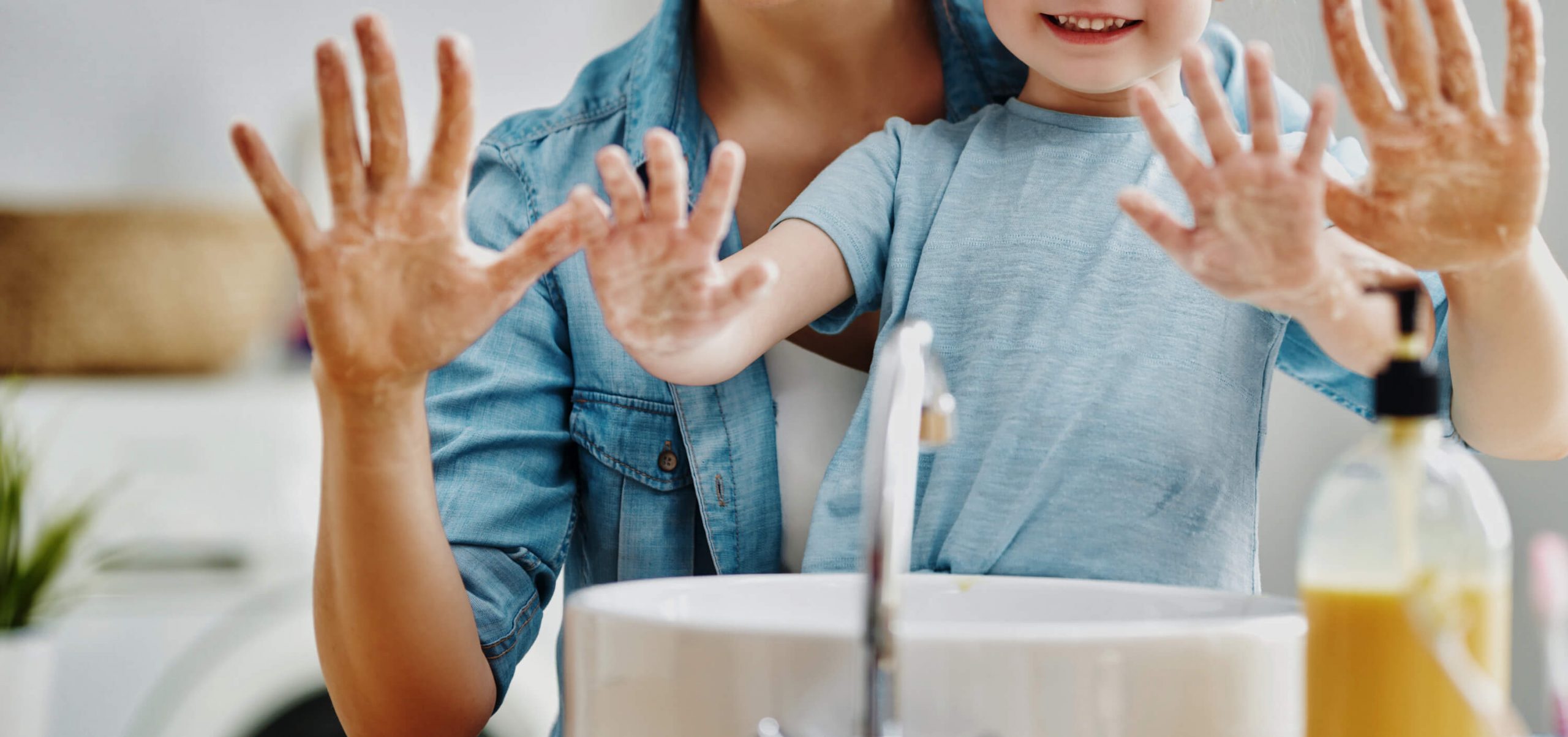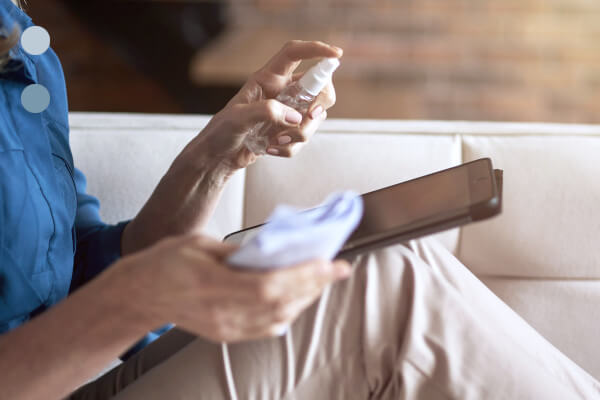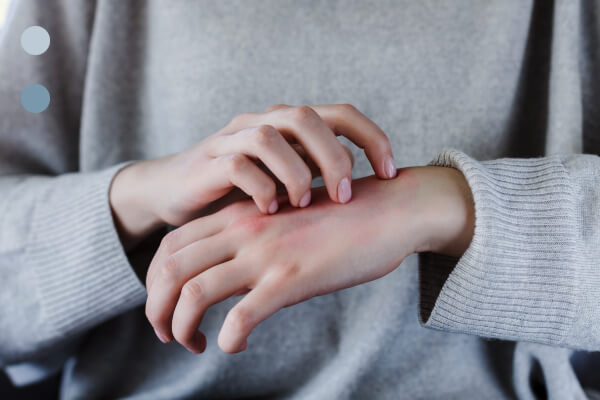
Good to know:
Hand hygiene in everyday life
Good to know:
Hand hygiene
in everyday life
Hand hygiene: Everyday protection against germs

The topic of hand hygiene is more current than ever – and for good reason. After all, most germs are actually transmitted via the hands. We use our hands all the time without giving them much thought: we blow our noses, pet animals, touch shopping carts and doorknobs, or prepare food, including raw meat. In the process, our hands can come into contact with germs everywhere.
If we subsequently touch our face with these hands, pathogens can easily enter the body via the mucous membranes – of the nose, mouth or eyes. They are also quickly passed on to other people by shaking hands or through objects.

Hand hygiene:
Everyday protection against germs

The topic of hand hygiene is more current than ever – and for good reason. After all, most germs are actually transmitted via the hands. We use our hands all the time without giving them much thought: we blow our noses, pet animals, touch shopping carts and doorknobs, or prepare food, including raw meat. In the process, our hands can come into contact with germs everywhere.
If we subsequently touch our face with these hands, pathogens can easily enter the body via the mucous membranes – of the nose, mouth or eyes. They are also quickly passed on to other people by shaking hands or through objects.

Washing your hands: Regularly and thoroughly
Therefore, regular hand washing protects against infections.
Hands should be washed not only when they are visibly soiled, but also in particular after every visit to the toilet, when the nose has been blown, after contact with door handles or doors in public buildings, after coming home and after contact with animals - and in reverse, for example, before every meal and before handling medicines or cosmetic products.
However, to be as effective as possible, above all, hands must be washed thoroughly:
Soap your hands thoroughly. This applies to the palms and backs of the hands, but also to areas that are easily forgotten, such as the thumbs, interdigital spaces of the fingers, and fingernails.
Take your time! To reliably remove not only dirt but also germs, hands should be washed for 20 to 30 seconds.
Rinse hands again under running water. The soap should be washed off again under running water, at a comfortable temperature.
Dry your hands carefully. This step also removes other germs that are still on the hands or in the water on the skin. Besides, moisture provides a particularly good breeding ground for viruses or bacteria.
Washing your hands:
Regularly and thoroughly
Therefore, regular hand washing protects against infections.
Hands should be washed not only when they are visibly soiled, but also in particular after every visit to the toilet, when the nose has been blown, after contact with door handles or doors in public buildings, after coming home and after contact with animals - and in reverse, for example, before every meal and before handling medicines or cosmetic products.
However, to be as effective as possible, above all, hands must be washed thoroughly:
Wet hands under running water. The temperature does not matter for the thoroughness of the cleaning, but water that is too cold or too hot can attack the skin's natural protective layer.
Soap your hands thoroughly. This applies to the palms and backs of the hands, but also to areas that are easily forgotten, such as the thumbs, interdigital spaces of the fingers, and fingernails.
Take your time! To reliably remove not only dirt but also germs, hands should be washed for 20 to 30 seconds.
Rinse hands again under running water. The soap should be washed off again under running water, at a comfortable temperature.
Dry your hands carefully. This step also removes other germs that are still on the hands or in the water on the skin. Besides, moisture provides a particularly good breeding ground for viruses or bacteria.
Frequent hand washing can dry out the skin
The downside of frequent hand washing is that it can strain the skin on your hands at the same time. Especially if too cold or too hot water is used, or if mild or pH-neutral soap is not applied, the skin's natural protective mantle can be attacked.
The top layer of skin consists of natural skin lipids and a protective acid mantle. The lipids can be washed out by frequent hand washing, while the acid mantle can be attacked and even destroyed, especially by soaps that are not gentle on the skin.
One consequence of this is that the skin dries out. This in turn can cause inflammation, cracks and even eczema, which in the worst case can become chronic. And extremely dry hands also pose a danger to general health: Pathogens can enter the body directly through cracks and open areas.

Frequent hand washing candry out the skin

The downside of frequent hand washing is that it can strain the skin on your hands at the same time. Especially if too cold or too hot water is used, or if mild or pH-neutral soap is not applied, the skin's natural protective mantle can be attacked.
The top layer of skin consists of natural skin lipids and a protective acid mantle. The lipids can be washed out by frequent hand washing, while the acid mantle can be attacked and even destroyed, especially by soaps that are not gentle on the skin.
One consequence of this is that the skin dries out. This in turn can cause inflammation, cracks and even eczema, which in the worst case can become chronic. And extremely dry hands also pose a danger to general health: Pathogens can enter the body directly through cracks and open areas.


Proper care against dry skin
To prevent the skin from drying out too much in the first place, moisturizing measures are particularly important, for example by using special creams. Ideally, these give the skin back the moisture it needs, soothe irritated hands and support skin regeneration at the same time.
The best products for this purpose are those that not only give the skin a short-term feeling of moisture or smoothness, but also support it from the inside out. This works, for example, with natural oils that ensure the skin retains more of its natural moisture. In addition, they have anti-oxidant and anti-inflammatory properties.
Often, these caring ingredients are replaced by cheaper, synthetically produced silicones. Although they are not harmful, they only have a superficial effect that is quickly washed away - which means that silicones end up in the environment via wastewater, where they are difficult to break down.
So when choosing hand care, opting for natural ingredients is not only sustainable for the skin, but also for our planet.

Proper care against dry skin
To prevent the skin from drying out too much in the first place, moisturizing measures are particularly important, for example by using special creams. Ideally, these give the skin back the moisture it needs, soothe irritated hands and support skin regeneration at the same time.
The best products for this purpose are those that not only give the skin a short-term feeling of moisture or smoothness, but also support it from the inside out. This works, for example, with natural oils that ensure the skin retains more of its natural moisture. In addition, they have anti-oxidant and anti-inflammatory properties.

Often, these caring ingredients are replaced by cheaper, synthetically produced silicones. Although they are not harmful, they only have a superficial effect that is quickly washed away - which means that silicones end up in the environment via wastewater, where they are difficult to break down.
So when choosing hand care, opting for natural ingredients is not only sustainable for the skin, but also for our planet.
